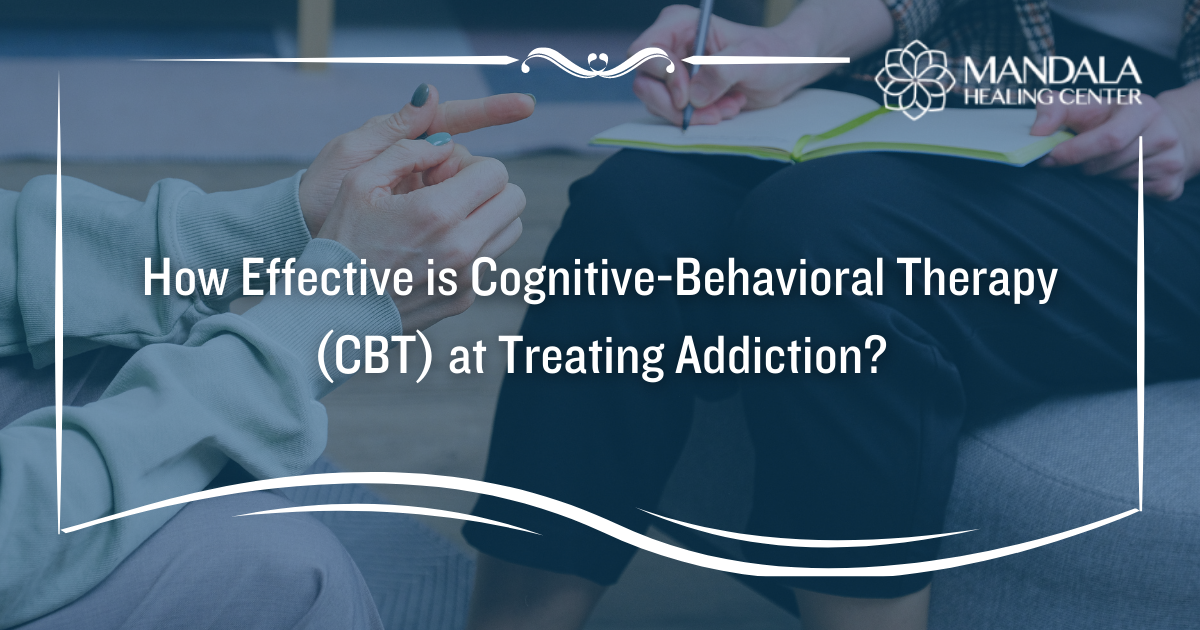Cognitive-behavioral therapy (CBT) is one of the most popular therapy methods used during addiction treatment. It teaches people how to make rational and logical connections between their thoughts, feelings, and actions. In the process, patients learn how their thoughts and behaviors impact their recovery and overall well-being.
CBT can be used in both group and individual settings–both of which can help patients develop healthy coping skills, change their thought patterns, and reduce the risk of relapse.
What is Cognitive-Behavioral Therapy (CBT)?
Cognitive-behavioral therapy (CBT) is a therapeutic approach that combines aspects of behavioral theory and cognitive theory, ideas that behaviors and cognition, respectively, impact a person’s well-being and quality of life. It is a collaborative and goal-oriented approach that aims to get rid of maladaptive thought patterns and behaviors to improve emotional regulation and produce positive lifestyle changes.
CBT is different from psychotherapy because it focuses on real-life situations, providing a hands-on approach that is more engaging than traditional psychotherapy techniques. CBT is also different from talk therapy because it involves more than just talking to a therapist. These therapy sessions consist of discussion, skill-building, goal setting, and at-home activities that patients are expected to do on their own time.
CBT is at the foundation of addiction treatment, however, it was originally developed as a mental health counseling method in the 1960s by Dr. Aaron T. Beck. In addition to addiction, CBT also treats co-occurring mental health conditions such as:[1]
- Anxiety
- Bipolar Disorder
- Attention Deficit Disorder (ADD)
- Eating Disorders
- Obsessive-Compulsive Disorder (OCD)
- Post-Traumatic Stress Disorder (PTSD)
One of the goals of CBT is to show patients how their harmful actions and emotions are not helpful, logical, or rational. It also helps patients identify where these harmful actions and emotions come from, whether it be past experiences, trauma, or environmental triggers.
By identifying these harmful thoughts–thoughts that often come naturally or automatically–patients can pinpoint the reasons why they abuse substances or struggle with mental health. And, by revisiting the events that caused the harmful thoughts in the first place, patients can reduce the pain the events caused while learning how to replace negative behaviors with more positive ones.
How is Cognitive-Behavioral Therapy (CBT) Used in Addiction Treatment?
People with substance use disorder are no strangers to “automatic” thoughts that are destructive, impulsive, and harmful. Negative thought processes and poor decision-making contribute to substance abuse in the first place. Fortunately, cognitive-behavioral therapy in addiction treatment targets the thoughts and behaviors that make people likely to self-medicate or abuse substances.
When it comes to treating addiction, CBT focuses on reducing or eliminating drug and alcohol-related patterns with healthier alternatives.[2]
CBT sessions may be held on a group or individual basis. The sessions move patients through three phases:
- Recognize the circumstances, thoughts, actions, or emotions that lead to substance abuse
- Avoid or remove oneself from these situations when at all possible
- Cope in a healthy way using CBT techniques to address and reduce the emotions or thoughts that led to substance abuse
There are many techniques that can be used during CBT. For example, therapists may ask patients to test their behaviors by contrasting negative thoughts with positive ones to see which thought is more effective in behavioral changes. Or, patients may be asked to recall past events or emotions, examine exactly what happened, and challenge irrational beliefs. Over time, patients should begin testing their own beliefs throughout the day, using CBT techniques to cope with whatever challenges arise during addiction treatment.
Benefits of Using Cognitive-Behavioral Therapy When Treating Addiction
It is extremely common for people who struggle with addiction to also struggle with destructive, negative thought patterns. When a person is unable to recognize a self-defeating pattern, they may continue acting out in this negative way, harming themselves or other people. The idea behind CBT is that cognition affects well-being so it is essential to adjust harmful thought patterns and behaviors and replace these things with more positive coping mechanisms.
There are many benefits towards using this approach in addiction treatment, including:
- Exploring the beliefs and thought patterns that lead to substance abuse and maladaptive coping mechanisms
- Modifying negative thoughts and behaviors to better support a sober lifestyle
- Introducing patients to useful, practical, and helpful coping strategies to use when faced with stressors or difficulties
- Improving communication skills and decision-making capabilities
- Helping patients dismiss false beliefs or thoughts that contribute to substance abuse
One of the best parts of using CBT to treat addiction is that many CBT techniques can be used outside of a therapist’s office. As a result, people in recovery can practice CBT exercises at home and incorporate them into everyday situations.
Find The Help You Deserve Today
Cognitive-behavioral therapy can help patients in addiction treatment programs recognize triggering situations, cope with these triggers, and learn healthier ways to deal with emotions that lead to substance abuse in the past. This can help prevent relapse and improve the overall quality of life.
If you or a loved one are struggling with addiction, you’ve come to the right place. Call now to get started with your recovery.
References:












